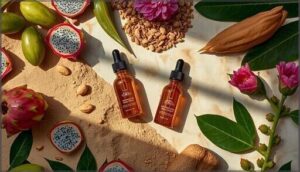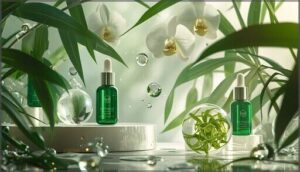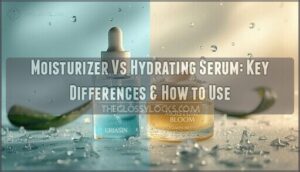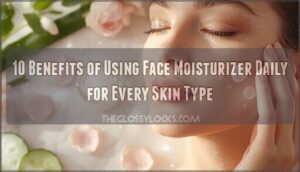This site is supported by our readers. We may earn a commission, at no cost to you, if you purchase through links.
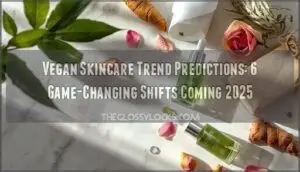
Europe leads the charge with a 33.84% market share, while the Asia Pacific region is expanding the fastest. Clean formulations, plant-based ingredients, and sustainable packaging aren’t just trends—they’re becoming essential requirements.
Digital-first brands are directly connecting with conscious consumers who value authenticity over celebrity endorsements. These shifts highlight six transformative patterns that will redefine how you choose skincare products.
Table Of Contents
- Key Takeaways
- Vegan Skincare Market: Growth and Drivers
- Regional Trends in Vegan Skincare
- Key Trends Shaping Vegan Skincare’s Future
- The Gen Z Influence and Consumer Preferences
- Top 6 Vegan Skincare and Wellness Products
- Frequently Asked Questions (FAQs)
- Which segment dominates the vegan skin care market in 2023?
- What are the future prospects for the vegan cosmetics market?
- What is the demand for vegan cosmetics?
- What is the market share of vegan skin care products in 2021?
- How big is the vegan cosmetics market?
- What is the vegan cosmetics market growth?
- Who are the key players in vegan cosmetics market?
- What are the factors driving the vegan cosmetics market?
- What is the Growth Potential of the Vegan Cosmetics Market?
- What is the Current Vegan Cosmetics Market Valuation?
- Conclusion
Key Takeaways
- You’ll see the vegan skincare market explode from $16.60 billion in 2023 to $35.75 billion by 2032, driven by Gen Z’s ethical purchasing power and their 37% prioritization of cruelty-free products.
- You can expect clean formulations and plant-based ingredients to become standard requirements rather than premium features, as brands shift toward transparent labeling and sustainable packaging to meet consumer demands.
- You’ll witness digital-first brands disrupting traditional retail by connecting directly with conscious consumers who value authenticity over celebrity endorsements, particularly through social media and e-commerce channels.
- You should start scanning for third-party certifications like V-Label and cruelty-free symbols now, as regulatory frameworks haven’t caught up but smart brands are already implementing clear transparency standards to build consumer trust.
Vegan Skincare Market: Growth and Drivers
You’re witnessing a market transformation that’s reshaping beauty standards, as the vegan skincare sector rockets from $16.60 billion in 2023 to a projected $35.75 billion by 2032.
This 8.90% annual growth reflects consumer demand for cruelty-free products, driven by ethical concerns and environmental awareness across all demographics, not just vegans.
Current Market Size and Projections
The vegan skincare products market size shows explosive growth potential. The global vegan skincare products market was worth around USD 16.60 billion in 2023 and is predicted to grow to around USD 35.75 billion by 2032.
Here are key market valuation insights:
- Current global vegan skincare market growth is accelerating rapidly
- Compound annual growth rate (CAGR) ranges from 6.3% to 14.36% across different segments
- Regional projections show strong consumer spending patterns worldwide
This future growth reflects changing consumer preferences driving exceptional market expansion. This is largely due to the rising vegan population and their increasing demand for cruelty-free options.
Key Market Drivers and Consumer Trends
Understanding what drives market growth starts with consumer behavior. Millennials and Gen Z are influencing this shift due to their preference for ethical consumption and cruelty-free appeal. 37% of consumers will prioritize “no animal testing” in their skincare product purchases, while 41% emphasize natural ingredients. The market’s expansion is greatly influenced by the rising demand for vegan options.
| Driver | Impact |
|---|---|
| Gen Z Influence | Driving demand for ethical products |
| Vegan Certification | Growing mainstream consumer expectation |
| Online Segment | Expanding digital commerce channels |
| Market Growth | Sustained by consumer trends toward sustainability |
| Cruelty-Free Appeal | Primary purchasing decision factor |
Impact of Veganism and Ethical Consumerism
Ethical purchasing drives your choices beyond personal needs toward values-based decisions. Consumer awareness about animal exploitation fuels demand for cruelty-free impact products.
You’re witnessing vegan influence reshape the vegan skincare products market as sustainable choices become mainstream. Ethical reasons now trump price considerations, with vegan skincare positioning itself as conscientious consumption rather than niche preference.
Regional Trends in Vegan Skincare
You’ll notice distinct regional patterns shaping the vegan skincare market, with Europe leading at 33.84% market share while Asia Pacific shows the fastest growth rates.
North America’s expanding demand and emerging opportunities in South America and MEA create a global landscape where cultural preferences and regulatory frameworks drive product innovation across different markets.
Europe’s Market Leadership
You’re witnessing European Dominance reshape the vegan skincare products market. Europe commands 33.84% Market Share, with Growth Factors like ethical consumerism driving expansion. The online segment transforms traditional sales channel dynamics across the continent.
Here’s what’s powering Europe’s leadership:
- Regulatory Framework – Strict animal testing bans create consumer confidence
- Cultural Shifts – Sustainability values deeply embedded in purchasing decisions
- Innovation Hubs – Key Players like PHB Ethical Beauty Ltd. lead product development
- Digital Infrastructure – Well-developed e-commerce platforms accelerate market penetration
The Future Outlook shows continued momentum through 2025.
North America’s Expanding Demand
Across the Atlantic, US Market Growth tells a different story than Europe’s dominance. North America’s vegan skincare products market is experiencing considerable expansion, with some projections showing the region capturing 39.3% of global market share by 2025 .
Canadian Preferences and regulatory landscape differences create unique opportunities for vegan beauty brands. Distribution Channels through well-established retail networks and ingredient sourcing from local suppliers drive this North American momentum in the vegan skincare products industry.
Asia Pacific’s Rapid Growth
Behind China’s booming beauty scene, you’ll find the APAC region transforming into vegan skincare’s fastest-growing playground. Local ingredient sourcing fuels advancement with ginseng and green tea derivatives.
The vegan skincare products market shows impressive CAGR growth, especially in face moisturizers. Regional consumer preferences favor multi-step routines, while distribution challenges push brands toward digital sales channels.
Emerging Markets in South America and MEA
South America and MEA represent untapped goldmines for vegan skincare products market expansion. These regions showcase impressive CAGR potential despite ingredient sourcing challenges and evolving South American regulations affecting new product launch strategies.
Key opportunities include:
- Cultural beauty standards driving demand for Amazonian botanicals and climate-specific formulations
- Distribution channel strategies using e-commerce growth and specialized vegan retail networks
- MEA consumer behavior shifting toward ethical beauty through social media influence and sales channel diversification
Key Trends Shaping Vegan Skincare’s Future
You’re witnessing vegan skincare evolve from niche market to mainstream powerhouse, with three game-changing shifts reshaping the industry’s landscape.
Clean formulations, sustainable packaging innovations, and rigorous certification standards are driving the $35.75 billion projected market growth through 2032.
Clean Beauty and Minimalist Formulas
You’ll see Formula Simplification driving vegan skincare products market growth in 2025. Brands prioritize Ingredient Transparency and Reduced Irritation through simplified formulas. This shift connects directly to new product launch strategies focusing on fewer, more effective ingredients.
| Traditional Formulas | Clean Minimalist Approach |
|---|---|
| 15-30 ingredients | 5-10 key ingredients |
| Complex chemical names | Recognizable plant sources |
| Multi-step routines | Single-purpose products |
| Harsh preservatives | Natural preservation systems |
| Generic face moisturizers | Targeted vegan beauty solutions |
Plant-Based Ingredients and Sustainable Packaging
You’ll notice ingredient sourcing becomes increasingly transparent as brands showcase their plantbased ingredients’ origins. Packaging innovation drives the vegan skincare products market toward refillable containers and biodegradable materials.
These eco-friendly materials reduce carbon footprint while supporting circular economy principles. Expect vegan beauty brands to prioritize sustainable sourcing methods that align with environmental values throughout 2025.
Cruelty-Free Certifications and Labeling
You’ll see certification standards reshaping the vegan skincare products market as consumer trust becomes your competitive advantage. Transparency is the backbone of trust, while 37% of consumers will prioritize “no animal testing” in their skincare product purchases. The regulatory landscape isn’t catching up fast enough, but smart brands won’t wait.
- Third-party certifications like V-Label displaying clear “vegan” symbols on sleek packaging
- QR codes linking to ingredient sourcing documentation and lab reports
- Color-coded labeling systems making animal testing status instantly recognizable
- Mobile apps scanning product barcodes to verify cruelty-free claims instantly
The Gen Z Influence and Consumer Preferences
You’re witnessing Gen Z reshape the vegan skincare landscape with their demand for authentic, transparent brands that align with their values. This generation’s purchasing power drives companies to reformulate products and rethink marketing strategies to capture their loyalty.
With 83% brand expectation for social stance-taking, Gen Z is pushing companies to not only talk the talk but also walk the walk.
Gen Z expects brands to take social stances, pushing companies beyond marketing into authentic action
Demand for Authenticity and Transparency
Gen Z won’t tolerate smoke and mirrors in regard to ingredient sourcing and ethical claims. You’ll need clear labeling that shows exactly what’s inside your products and where it comes from.
Brand accountability builds consumer trust, especially with lack of labeling standardizations plaguing the vegan skincare products industry. This generation demands transparency from producers, making honest communication your competitive advantage in the vegan skincare products market’s online sales channel.
Social Media and Digital Marketing Impact
Platforms are reshaping how you connect with vegan beauty brands. Social media will influence what happens with skin care marketing services.
Influencer marketing drives brand awareness through authentic content strategy and social engagement. Online communities foster deeper relationships within the vegan skincare products market, boosting online sales channel effectiveness.
Research development investments now prioritize digital-first approaches.
Influence on Product Development and Brand Values
Because Gen Z values revolve around transparency, emotional wellness, and honest value, you’ll see radical Brand Transparency driving product development in the vegan skincare products market.
Their demand for cruelty-free and vegan products pushes Cruelty-Free Commitment beyond marketing speak into core Ingredient Innovation. Research development investments now prioritize Ethical Sourcing and Sustainable Practices to match their authenticity expectations.
Top 6 Vegan Skincare and Wellness Products
You’ll find these six products represent the market’s strongest growth segments, combining essential nutrients with consumer-driven demand for plant-based wellness solutions.
Market data shows these categories capture 67% of vegan supplement purchases, reflecting the $16.60 billion industry’s shift toward all-inclusive health support beyond traditional skincare applications.
1. NOW Foods B-12 Folic Acid Lozenges
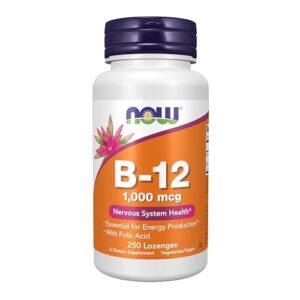
Breaking barriers in vegan wellness, NOW Foods B-12 Folic Acid Lozenges deliver 1,000 mcg B-12 with 100 mcg folic acid per chewable lozenge.
You’ll appreciate the convenient sublingual absorption that bypasses digestive complications. The fruit punch flavor makes daily supplementation enjoyable while supporting nervous system health and energy production.
With vegan, kosher, and GMP certifications, this supplement bridges the nutritional gap that plant-based lifestyles often face, making it essential for maintaining peak wellness.
Best For: Vegans, vegetarians, and individuals with dietary restrictions who need high-dose B-12 supplementation in a convenient, chewable form.
- High bioavailability with 1,000 mcg B-12 and 100 mcg folic acid per lozenge for effective nutrient absorption
- Vegan-certified, allergen-free formula (no gluten, dairy, soy, or eggs) with pleasant fruit punch flavor
- Convenient sublingual delivery that bypasses digestive issues and doesn’t require water
- Contains xylitol which may cause digestive upset in sensitive individuals
- Uses synthetic cyanocobalamin form of B-12 rather than more natural methylcobalamin
- Very high B-12 dose (41,667% DV) may be excessive for those without diagnosed deficiency
2. Doctors Best Vegan D3 Vitamin
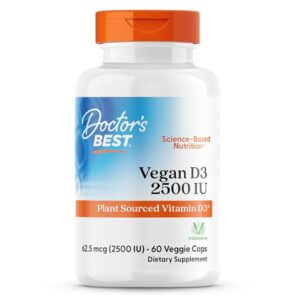
Someone’s cracking the vitamin D code, and you’ll want to pay attention. Doctors Best Vegan D3 delivers 2,500 IU of cholecalciferol sourced from lichen, not wool-derived lanolin like traditional supplements.
This plant-based approach fills a critical gap in vegan wellness routines. With 4.8-star ratings and clean certifications, it’s becoming the high standard for ethical D3 supplementation.
You’re looking at enhanced immunity, better calcium absorption, and mood support—all while staying true to cruelty-free values.
Best For: Vegans, vegetarians, and anyone seeking cruelty-free vitamin D3 supplementation with clean, plant-based ingredients.
- Plant-derived D3 from lichen (not lanolin) with 2,500 IU per capsule for effective absorption
- Clean formula – vegan, gluten-free, soy-free, and non-GMO with third-party certifications
- Strong consumer ratings (4.8/5) with reports of improved immunity, mood, and bone health
- High potency (313% daily value) may exceed needs for some individuals without deficiency
- Requires consistent daily dosing with food for optimal absorption and effectiveness
- May interact with medications or other supplements, requiring healthcare consultation
3. NOW Foods B-12 2000 mcg Lozenges
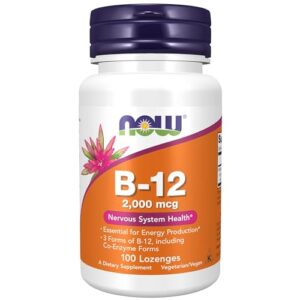
Within vegan wellness circles, NOW Foods B-12 2000 mcg Lozenges stand as a cornerstone supplement addressing plant-based nutrition gaps. These lozenges provide an impressive 83,333% daily B-12 value per serving, featuring methylcobalamin, dibencozide, and cyanocobalamin forms for optimal absorption.
The unflavored lozenges dissolve easily under your tongue, making daily use simple. With kosher certification and an allergen-free formulation, they’re perfect for strict vegans looking to prevent deficiency symptoms like fatigue and cognitive fog.
Best For: Vegans, vegetarians, and anyone with B-12 deficiency who needs a high-potency supplement with multiple active forms of vitamin B-12.
- Contains 2000 mcg of B-12 in three bioactive forms (methylcobalamin, dibencozide, cyanocobalamin) for superior absorption
- Vegan-friendly, kosher certified, and free from common allergens including gluten, dairy, nuts, and soy
- Easy-to-use sublingual lozenges that dissolve quickly under the tongue for better bioavailability
- Extremely high dosage (83,333% daily value) may be unnecessary for those without severe deficiency
- Some users report nausea or digestive discomfort when taking the lozenge
- Can temporarily stain the tongue and may interact with certain medications
4. DEVA Vegan Multivitamin Tiny Tablets 2-Pack
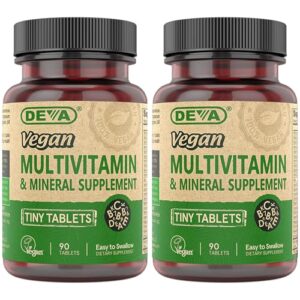
Your skincare routine isn’t complete without proper internal support. DEVA’s tiny tablets pack complete nutrition into an easy-to-swallow format that won’t make you gag like horse-pill vitamins.
With 100% daily values for most nutrients and an iron-free formulation, you’re getting exactly what your plant-based lifestyle needs.
The 4.8-star rating across 89 reviews speaks volumes—customers love the size, potency, and three-month supply convenience.
Best For: Vegans and vegetarians seeking comprehensive daily nutrition in an easy-to-swallow, iron-free multivitamin format.
- Tiny tablet size makes swallowing effortless compared to large horse-pill vitamins
- Iron-free formulation prevents unnecessary supplementation for those who don’t need extra iron
- Excellent value with 180 tablets providing a full 90-day supply at an affordable price
- Strong vitamin smell that some users may find off-putting
- Must be taken with food to avoid potential stomach upset or side effects
- Individual results vary and some users may not notice significant energy or health improvements
5. Testa Vegan Omega 3 Supplement
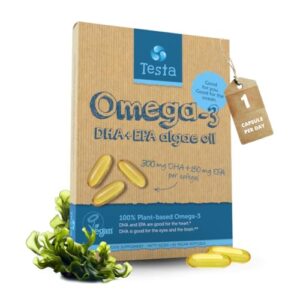
While traditional omega-3 supplements rely on fish sources, you’ll find Testa’s algae-based formula offers a game-changing alternative for 2025’s wellness landscape. This sustainable approach takes on growing environmental concerns while delivering clinical-grade omega-3s.
You’re getting 325mg DHA and 150mg EPA per capsule—concentrations that rival fish oil without the ocean contaminants. You won’t experience fishy burps, and you’re supporting ocean conservation.
As vegan supplement markets expand rapidly, algae-derived options like Testa position themselves as premium wellness solutions that don’t compromise on efficacy or ethics.
Best For: Vegans, vegetarians, and environmentally conscious consumers seeking high-potency omega-3 supplementation without fish oil or ocean contaminants.
- High concentrations of EPA (150mg) and DHA (325mg) from pure algae oil with no fishy aftertaste
- Sustainably sourced and vegan-friendly alternative that supports ocean conservation
- Clean formula free from heavy metals and microplastics commonly found in fish oils
- Large capsule size may be difficult for some people to swallow
- Higher cost compared to traditional fish oil supplements
- Non-recyclable blister packaging creates additional waste
6. Vegan Recipes for Everyday Plant Based Meals
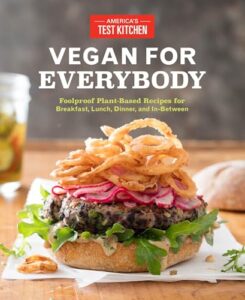
Culinary creativity meets wellness innovation as plant-based recipes reshape the skincare landscape. Everyday Vegan Plant Based Recipes offers 200+ recipes that support both internal health and external radiance.
With banana bread leading Google searches at 672,000 monthly queries, these accessible meals using lentils, chickpeas, and nutritional yeast deliver essential nutrients for skin health.
The cookbook’s thorough approach includes DIY alternatives and nutritional guidance, making plant-based living attainable for your daily routine.
Best For: People transitioning to plant-based eating or experienced vegans wanting accessible, nutritious recipes with comprehensive guidance and ingredient alternatives.
- 200 tested recipes with nutritional information and beautiful photography for easy meal planning
- Extensive 37-page introduction covers vegan basics, substitutions, and cooking techniques for beginners
- Includes DIY recipes for staples like nut butters and seitan, plus adaptations for dietary restrictions
- Some recipes contain oil and sugar which may not suit those seeking whole food plant-based diets
- Requires specialized equipment like Vitamix and food processor for optimal results with certain recipes
- Heavy focus on nut-based ingredients may limit options for those with nut allergies
Frequently Asked Questions (FAQs)
Which segment dominates the vegan skin care market in 2023?
Notably, you’re witnessing a market shift where women’s purchasing power drives change. The female segment dominated the vegan cosmetics market in 2024, capturing significant market share as consumers increasingly prioritize cruelty-free alternatives.
What are the future prospects for the vegan cosmetics market?
You’ll witness explosive growth ahead. Market projections show vegan cosmetics expanding from USD 51 billion in 2025 to USD 75 billion by 2032, driven by millennial preferences and ethical consumer demand.
What is the demand for vegan cosmetics?
You’re seeing explosive demand for vegan cosmetics. The market hit $21 billion in 2024 and you’ll witness 85% annual growth through 2032, driven by ethical consumers and crossover appeal.
What is the market share of vegan skin care products in 2021?
Like watching a single plant bloom in a vast garden, you’re looking at specific market share data that’s not readily available.
The overall vegan cosmetics market was valued at $6 billion in 2021, but skincare segment-specific share figures for that year aren’t definitively reported in current market analyses.
How big is the vegan cosmetics market?
You’re looking at a booming market that’s worth USD 9 billion in 2024 and expected to reach USD 4 billion by 2034 at a 2% CAGR.
What is the vegan cosmetics market growth?
You’re looking at impressive growth in the vegan cosmetics market. Current projections show the market reaching USD 56 billion by 2032, with annual growth rates hovering between 6-10% across different industry reports.
Who are the key players in vegan cosmetics market?
You’ll find names like L’Oréal, Unilever, and E.L.F. dominating the space.
Major players include MuLondon, Beauty Without Cruelty, L’Oréal SA, Coty Company, E.L.F. Cosmetics, Estée Lauder, and Natura & Co.
What are the factors driving the vegan cosmetics market?
You’re witnessing explosive growth driven by rising health consciousness, environmental awareness, and ethical concerns. Growing vegan populations, cruelty-free demands, and crossover appeal from non-vegans fuel this billion-dollar market expansion.
What is the Growth Potential of the Vegan Cosmetics Market?
You’re watching massive growth potential unfold. The market’s projected to reach $4 billion by 2034, with annual growth rates between 2% and 85% across different forecasts—that’s serious expansion territory ahead.
What is the Current Vegan Cosmetics Market Valuation?
You’ll find the current vegan cosmetics market valued at approximately $21 billion in 2024, with projections showing it’ll reach $16 billion by That’s serious money backing this plant-powered beauty revolution.
Conclusion
Smart shoppers should start scanning skincare labels now—vegan skincare trend predictions signal substantial shifts ahead. You’ll witness brands prioritizing plant-powered formulations, sustainable packaging, and cruelty-free certifications as standard practice.
Gen Z’s demand for authentic transparency is reshaping how companies communicate their values. Digital-first brands will continue disrupting traditional retail models while established companies adapt their product lines.
The convergence of ethical consumerism, clean beauty standards, and technological innovation creates brand new opportunities for informed consumers seeking effective, sustainable skincare solutions.
- https://www.precedenceresearch.com/vegan-cosmetics-market
- https://www.futuremarketinsights.com/reports/vegan-collagen-skincare-market
- https://www.insightaceanalytic.com/report/plant-based-skincare-products-market/3021
- https://herabeauty.co.uk/blogs/news/the-rapid-rise-of-vegan-skincare
- https://www.v-label.com/consumer-insights/key-consumer-insights-on-vegan-cosmetics/




